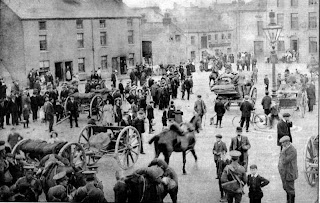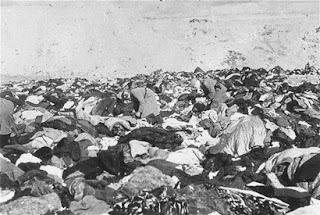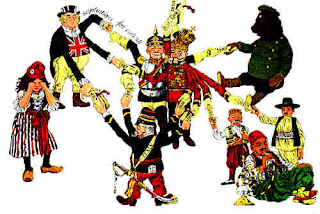In your own words define, tyranny, injustice and self-determination and then using examples from Animal Farm explain how they all relate to the overthrow of Farmer Jones.
Tyranny is an unfair and unjust way of ruling by an autocrat or one person. Injustice is an unfair or unjust way of treating someone else. Self-determination is someone's or something's right to choose for itself.
Farmer Jones was an autocrat and a tyranny to the animal's point of view, who took away their harvest and the commodities they produced. The animals had no such idea as justice or self-determination and just led their lives. And then came the pigs who were the brain stormers, who thought of all the possible ideas and decisions. They told the animal that they were only doing it for justice as Farmer Jones was injustice. And so the animals started to dream about their life with self-determination and no one ruling over them. All these ideas presented by the pigs caused the animals to go against the farmer and overthrow him.
Monday, January 26, 2009
Feedback January 19-23- Tyranny, Injustice and Self-determination in Animal Farm
Posted by Subin at 11:22 PM 0 comments
Thursday, January 22, 2009
WWI Illustrated Poem _The Sounds of Bells
WWI Illustrated Poem
The Sounds of Bells
The air is filled
with the sounds of bells
The cows are here! Here they are!
They jingle past the doorways
the tingle giving pleasure to inmates.
The air is filled
with the sounds of bells
The soldiers are here! Here they are!
They march past the doorways
the welcoming peals of bells
linger giving pleasure to the soldiers.
The air is filled
with the sounds of guns
The foes are here! Here they are!
Bang bang the bullets boom past the trenches
as the soldiers crawl over the blood-dried barbed wires
and enter no man's land
bodies scattered like dead autumn leaves .
The air is thick
The dead are here! Here they are!
buried cold and pale
as the moaners circle the graves
the cries echo in the hills.
SuBin
citations
http://upload.wikimedia.org/wikipedia/commons/6/6d/A_World_War_1_Story,_Part_6._Hutt_Valley,_Wellington,_New_Zealand,_14_April_1916_(437353411).jpg
http://dailydish.typepad.com/the_daily_dish/images/einsatz1.jpg
http://www.ralphmag.org/CG/war-dead388x278.gif
http://www.southlakes-uk.co.uk/old/thegillww1.jpg
http://img.dailymail.co.uk/i/pix/2007/10_02/trenchPA_468x607.jpg
Posted by Subin at 1:51 AM 3 comments
Monday, January 19, 2009
Would you join the military?
In some countries, joining the military is mandatory, in other countries, optional. For example, in Israel and Singapore both men and women are required to perform two years compulsory military service right after high school. Does your country require military service? If so, how do you feel about this? If not, under what conditions would you ever join the military to defend your country?
In South Korea, both women and men are allowed to join the military. For men, it's mandatory to join in the military while it's optional for the women. One is required to work in the military for 24 to 28 monthes which will change into 18 monthes in 2016. You have to be aged between 18 to 26 and have atleast have had a middle school education to be able to join in.
I thought that this was nethier good or bad. It could be good in a way since women are free to choose rather they'd like to join the military. But I think that it's more towards the good side since people are free to join in unless they atleast have a middle school education. I think if I was required to do the military service, I would do it. I don't think that I would want to run away from it.
Posted by Subin at 1:00 AM 0 comments
Monday, January 12, 2009
Feedback January 5-9 _Political cartoon evaluation
 The political cartoon on the left includes men and a bear, shaking hands with each other. Except for a girl standing in the left corner and no one's trying to shake hands with her. This political cartoon shows the treaties made between countries in the 18th century. Each one of the characters in the cartoon represents a powerful country at that time. Some of the men have a lot of allies while some only have a few. But as everyone start to make more treaties with each other, the treaties become more entangled.
The political cartoon on the left includes men and a bear, shaking hands with each other. Except for a girl standing in the left corner and no one's trying to shake hands with her. This political cartoon shows the treaties made between countries in the 18th century. Each one of the characters in the cartoon represents a powerful country at that time. Some of the men have a lot of allies while some only have a few. But as everyone start to make more treaties with each other, the treaties become more entangled.
This cartoon relates to the Great Powers Game where people were divided into each countries and had to make the countries stronger. We could also make treaties with other countries to make sure that the other countries would not attack you. But making alliance never gave you profit because the other countries could break the alliance whenever they wanted to and attack you. The powerful countries would not care about the alliances they had made and just start a war to gain more profit. So no one could trust each other completely.
The cartoonist is trying to tell the reader that making alliances just for the sake of making more would not help you later on. The alliances would be so tangled up that it gets confusing and make everything more difficult.
Some evidences in the cartoon that supports my opinion about the cartoonist's feelings are the fact that the cartoon is intectionally made difficult to uderstand which is connected to which and who is against whom.
To make this cartoon more effective, the cartoonist could have made it more entangled up and clear about who is who. And to make this cartoon more persuasive, the cartoonist could have made the hands more entangled because that is what the cartoonist is trying to show.
As you can see, the cartoon relates to the Great Powers game, in a way. In the game, we were allowed to make alliances with the countries that we did not wanted to fight with. However, the alliances got all mixed up between the countries and at the end, the alliances did not matter. No matter you had made alliance with a powerful country, it wouldn't help your country if it did not want to and it could attack you at any moment.
Posted by Subin at 1:36 AM 0 comments
Thursday, January 8, 2009
Great Powers Game Debrief
1. Which country were you? How did it feel to build your empire? Which countries had the advantage at the start of the game? Why? How did you empire compare to other empires?
My country was the Ottoman Empire. At first I was really worried that the game would be to complicated. I also was depressed at the descripsion of my country. I think that countries such as The Great Britain, France, and Germany etc had more advantages that the others since they were already storng and powerful as they had expanded their land. On the otherhand, my country was weak in economy, and while having a lot of enemies, we had only a few allies.
2. In the long run was it more important to buy armies, navies, industries or colonies? Why?
At first it much important to buy more colonies an industries to get more armies. Because by expanding the land and the economy, more people are available to build a strong army. and in the game, the more industry cards and colony cards you had, the more cards you could get in return.
3. What did you do well? What would you have done differently?
I think that we tried our best to keep peace and stay out of wars. It was to risky for us to go to wars since we were not so powerful and had poor armies. If I could do this game again, I would buy as many colonies and industries I can, and then to make my armies strong.
4. How successful were your alliances? Did they help or hurt you? Could they be trusted?
My alliances were mostly very successful but we never got anything in return since we never participated in wars or helped our alliances. I thought that I couldn't trust them entirely, just in case. But none really cared about my little country so I didn't really worry about our trust to them.
5. What are three specific things you learned about conflict from this simulation?
One of the things I learned from this simulation was that you should be ready to risk to get more powerful. Also, that buying armies from the the very beginning wont help later. All the powerful countries that became mighty thoguth really carefully when choosing between armies cards and industry cards. The stronger countries knew that taking more industry cards will give more apportunities to get other cards so they started with industry cards. Also, when they were strong enough, they started a war which was risky but when they won, they could get richer the easy way out. The last thing I learned from the simulation was that life is unfair. Eventhough you were one of the strongest countries, you could lose everything and become one of the poorest coutries.
Posted by Subin at 9:36 AM 0 comments
Monday, January 5, 2009
End of Quarter 2 Feedback
My goals in the 2nd quarter was to improve in writing essays and learn more vocabularies by reading and try to read more non-fiction than fiction. I think that i have improved on writing essays but still needs an improvement on sentence fluency and grammar. I think I never really got to read a lot and didn’t learn new vocabularies.
What are three specific goals that you have for quarter three in humanities?
My first goal is the same as the last quarter’s goal: I’m going to improve on writing essays by practicing grammar and reading other people’s essays. My second goal is also the same: I’m going to learn more vocabularies by reading. My third goal is to improve on my oral communication skills since I’m weak at speaking in public. I can achieve my goal by reading out loud when I’m reading a book and talk in English with my sister more.
Posted by Subin at 9:09 PM 0 comments
